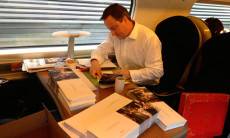November 7, 2013
RIBA heralds dawn of a ‘smart’ era that revolutionises the way we shape our cities
 A new report that explores the massive potential role that data could have in the planning and design of our buildings and cities has been launched by the Royal Institute of British Architects (RIBA) and ARUP. The report ‘Designing with data: Shaping our future cities’ identifies the main approaches to working with data for those involved in designing and planning cities. Better data can offer a deep insight into people’s needs and has the potential to transform the way architects and urban planners design our built environments. This could result in cheaper experimentation and testing of designs before construction begins. It also promises the chance for greater consultation with potential users – speeding up the process, saving time and money and resulting in better and more affordable design. More →
A new report that explores the massive potential role that data could have in the planning and design of our buildings and cities has been launched by the Royal Institute of British Architects (RIBA) and ARUP. The report ‘Designing with data: Shaping our future cities’ identifies the main approaches to working with data for those involved in designing and planning cities. Better data can offer a deep insight into people’s needs and has the potential to transform the way architects and urban planners design our built environments. This could result in cheaper experimentation and testing of designs before construction begins. It also promises the chance for greater consultation with potential users – speeding up the process, saving time and money and resulting in better and more affordable design. More →





























November 5, 2013
Technology fix. What employers can do when social media becomes an addiction
by Pam Loch • Comment, Legal news, Technology, Workplace
Recent research shows that technology has helped us to become nearly five times more productive than we were in the 1970s. As well as enabling social interaction and personal expression, social media such as LinkedIn and Twitter can be valuable business aids for innovation and collaboration. However, with over half of people under 25 admitting they have to check Facebook at least once a day, it’s clear that for many, social media has become more than a form of virtual engagement. This can create something of an issue in the workplace, leaving employers with the dilemma of balancing the positive aspects of online communications while discouraging time wasting. More →